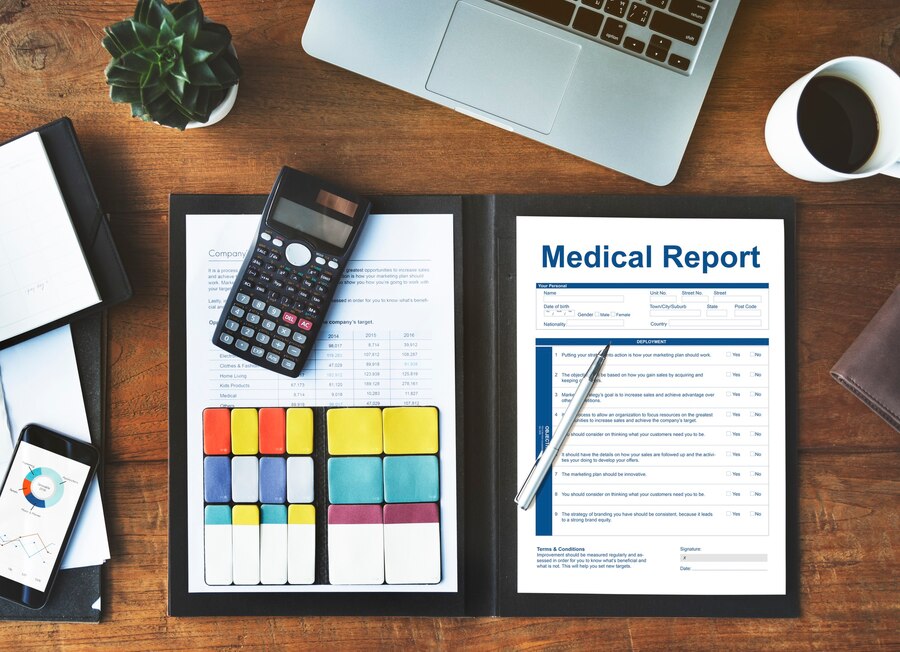Technology is becoming increasingly indispensable in the ever-evolving healthcare landscape, revolutionizing medical billing processes. If you're seeking ways to optimize your medical billing, this blog will help you to improve your medical billing through technology.
Discover how innovative solutions like electronic health records (EHR), Artificial intelligence (AI) and practice management software can streamline your workflows, improve accuracy, and maximize revenue. Join us on this enlightening journey as we explore the practical steps to leverage technology for improved medical billing and secure financial success for your practice.


In today’s digital age, technology has become an indispensable tool for optimizing various aspects of healthcare, including medical billing. Using technology in medical billing, you can boost efficiency, accuracy, compliance, workflow, and data-driven decision-making.
By implementing CloudRCM technology solutions such as electronic health records (EHR) and practice management software streamlines your billing processes. Automated systems simplify tasks like patient data entry, claim generation, and payment tracking. By reducing manual efforts, you can save time, improve efficiency, and ensure accurate and timely billing.
Technology tools like artificial intelligence (AI) and machine learning (ML) algorithms improve the accuracy of your medical billing. These technologies can detect coding errors, validate claims, and identify compliance issues, reducing the risk of claim denials. By optimizing coding accuracy and improving documentation, you can maximize revenue capture and increase your practice’s financial viability.
Technology solutions help ensure compliance with regulations such as HIPAA and protect patient data. Robust data security measures, including encryption and access controls, safeguard sensitive information. Automated audits and fraud detection tools mitigate billing fraud risks. Through this, you can identify coding errors, ensure compliance and protect your practice’s reputation.
Incorporating technology into your RCM processes provides valuable insights through data analysis and reporting. Predictive analytics and reporting tools enable you to identify patterns, trends, and potential revenue gaps. By leveraging this data, you can make informed decisions to optimize your billing processes, identify areas for improvement, and drive financial growth.
Technology solutions streamline your revenue cycle management, from patient registration to claims submission and payment posting. By centralizing and automating these processes, you reduce manual errors, improve claim accuracy, and enhance overall revenue cycle efficiency. This, in turn, accelerates reimbursement timelines, increases cash flow, and helps you achieve optimal financial outcomes.
By leveraging technology, you can implement automated systems that flag potential fraudulent activities, ensuring the integrity of your billing processes. Technology tools analyze data patterns and detect anomalies. It’s helpful to identify potential instances of fraudulent billing practices, protecting your practice from financial risks. Technology-enabled fraud detection reduces improper billing, safeguards your reputation, and ensures regulatory compliance.
Moreover, transform healthcare operations with artificial intelligence in healthcare. AI-driven analytics and automation enhance patient outcomes, reduce costs, and streamline medical billing processes.

With advanced capabilities of technology, you can transform your medical billing processes, leading to improved efficiency, accuracy, and financial outcomes. Here are the key ways to improve your medical billing by technology:
Electronic Health Records (EHR) systems are crucial to transforming old-fashioned billing into modern billing in modern medical billing. By digitizing patient data, EHRs streamline the documentation process and reduce the risk of errors associated with manual record-keeping. EHRs also enable seamless integration with billing systems, allowing for automatic population of billing codes and improved accuracy.
Moreover, EHRs facilitate efficient communication and collaboration among healthcare providers, reducing delays in obtaining necessary information for billing. EHRs simplify coding and documentation by centralizing patient data access. Readily available information in your EHR ensures accurate billing processes.
Practice Management Software is specifically designed to streamline medical billing processes. These systems offer a range of features, including appointment scheduling, claim generation, and payment tracking. By automating these tasks, practice management software eliminates manual errors and reduces administrative burdens, resulting in increased efficiency.
In addition, practice management software enables the integration of billing data with EHRs and other systems, ensuring seamless coordination throughout the revenue cycle. With real-time updates and notifications, you can stay on top of outstanding claims, denials, and payments. This enables timely follow-ups and optimized revenue capture for your practice.
AI and ML technologies are revolutionizing medical billing by automating manual processes, detecting errors, and providing valuable insights. These technologies can analyze large volumes of data to identify coding errors, validate claims, and flag potential compliance issues.
Other than that, AI-powered tools can also assist with accurate coding and documentation by offering suggestions and real-time edits. By leveraging AI and ML, you can improve coding accuracy, reduce claim denials, and optimize reimbursement by identifying patterns and trends in billing data.
Electronic claims submission eliminates the need for manual paper-based processes, resulting in faster claim processing and reduced errors. By electronically submitting claims to insurance payers, you can track your status in real-time, identify any issues, and resolve them promptly.
Integration with clearinghouses or direct connectivity with payers further streamlines the claims submission process. Electronic submission reduces claim rejections, minimizes administrative costs, and accelerates reimbursement. It leads to improved cash flow and reduces billing errors for your practice.
As technology advances, protecting patient data and ensuring compliance with privacy regulations, such as HIPAA, becomes paramount. Implementing robust data security measures, such as encryption, access controls, and regular backups, safeguards sensitive information from unauthorized access or breaches.
Technology solutions also offer built-in compliance features that help adhere to regulatory requirements. For instance, audit trails can track changes made to patient records, ensuring transparency and accountability. By prioritizing data security and compliance, you instill trust in your patients and maintain a strong reputation for your practice.
Leveraging analytics tools provides valuable insights into your medical billing performance. By analyzing data trends and patterns, you can identify opportunities for improvement. It’s also helpful to optimize coding accuracy, and proactively address revenue gaps.
Analytics enable you to assess key performance indicators (KPIs), such as claim denial rates, average reimbursement time, and revenue per encounter. These insights empower you to make informed decisions, implement effective strategies, and drive financial growth for your practice.
Apart from that, maximize your healthcare revenue by optimizing cash flow through effective A/R follow-up. Our specialized solutions help you manage accounts receivable, reduce errors, and improve financial performance.
Leveraging technology is essential to optimize your medical billing processes. CloudRCM offers comprehensive solutions that streamline workflows, enhance accuracy, ensure compliance, and maximize revenue capture. By integrating CloudRCM’s technologies into your practice, you can automate tasks and improve efficiency.
With our expertise in modern medical billing, we ensure error-free billing and streamlined workflows to provide you with better results. Contact us today to revolutionize your medical billing operations and drive success for your practice.
In addition, explore the benefits of telemedicine in improving patient care, including reduced hospital readmissions, improved medication adherence, and enhanced patient satisfaction through personalized virtual care.
Technology simplifies medical billing by automating tasks like appointment scheduling, claims submission, and payment tracking. It reduces paperwork, minimizes errors, and saves you time and effort.
With electronic health records (EHR), you can easily access patient information, streamline coding, and improve documentation accuracy. EHR systems integrate with billing software, ensuring seamless data transfer and eliminating the need for manual data entry.
Practice management software streamlines billing tasks such as claim generation, denial management, and payment reconciliation. It helps you stay organized, track outstanding claims, and optimize revenue capture, leading to improved financial performance.
Yes, technology solutions offer built-in features to help you comply with regulations like HIPAA. These features include data encryption, access controls, and audit trails to protect patient information and maintain regulatory compliance.
Technology tools utilize advanced algorithms and artificial intelligence to detect potential coding errors, billing discrepancies, and fraudulent activities. These tools analyze data patterns, identify anomalies, and flag suspicious billing practices, safeguarding your practice’s financial integrity.
Absolutely, technology enables streamlined claims submission, quicker reimbursement, and efficient revenue cycle management. It offers analytics tools to track key performance indicators, identify revenue gaps, and make data-driven decisions for optimizing your revenue cycle.
By embracing technology solutions tailored for medical billing, you can enhance efficiency, accuracy, and revenue optimization. These technologies automate processes, reduce errors, and provide valuable insights to help you improve financial outcomes and achieve a healthy bottom line.
Yes, technology streamlines billing processes, reduces errors, and ensures accurate and timely billing, resulting in improved patient satisfaction. Enhanced efficiency and transparency in billing contribute to a positive patient experience.
Technology solutions automate tasks, streamline workflows, and provide real time updates, accelerating revenue cycle management. This reduces administrative burdens, improves cash flow, and optimizes revenue capture for your practice.
While there may be upfront costs associated with implementing technology solutions, the long-term benefits outweigh the investment. Improved efficiency, accuracy, and revenue optimization result in cost savings and better financial outcomes for your practice.

Revenue Cycle Management (RCM), the method for handling healthcare claims adjudication, is the revenue generator for